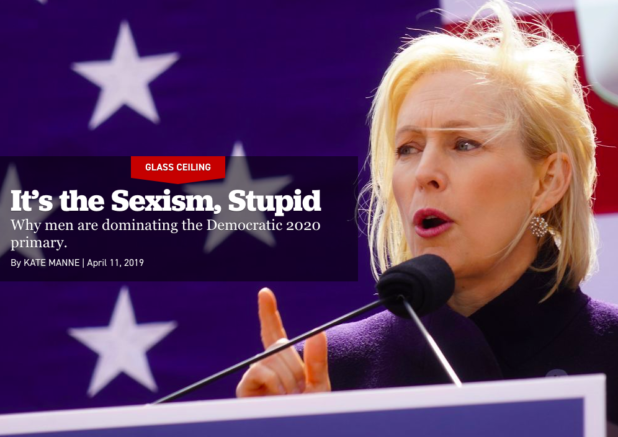Andrew Anglin
Daily Stormer
April 14, 2019
POLITICO has published an article by a prominent (and probably Jewish) slut named Kate Manne about why people don’t want to elect a slut to lead their country.
Kate Manne, prominent slut and slut activist
Manne is a professor of philosophy at Cornell, where she promotes the aggressive behavior of sluts and the total destruction of society at the hands of women.
She claims that “sexism” is responsible for people not being interested in a slut leader, and I don’t really understand this argument.
So let’s look at how she explains it.
Two white male presidential candidates—Joe Biden and Bernie Sanders—have led the Democratic field from the start, and two others—Beto O’Rourke and Pete Buttigieg—have basked in glowing coverage. Meanwhile, experienced female rivals—Kirsten Gillibrand, Kamala Harris, Amy Klobuchar and Elizabeth Warren—haven’t generated nearly the same media buzz, or led any recent polls.
What’s going on here? The evidence is mounting that these patterns are the work of sexism and misogyny—albeit often unconscious, unwitting and the result of implicit bias.
Even before the 2016 election, when Donald Trump defeated Hillary Clinton, the first female nominee of a major party in American history, amid deafening campaign-trail chants of “Lock Her Up,” there were plenty of signs that female presidential candidates face unique obstacles.
In their 2008 article, “Subtle Sexism? Examining Vote Preferences When Women Run Against Men for the Presidency,” authors David Paul and Jessi L. Smith showed that gender is a powerful force in inducing voters to defect across party lines. Specifically, when men and women were pitted against each other in head-to-head match-ups for the presidency, a substantial proportion of Democratic voters (12.3 percent) defected to a male Republican, John McCain, rather than vote for a female candidate from their own party, Hillary Clinton.
Similarly, and arguably somewhat less surprisingly, a sizeable proportion of Republican voters (15.5 percent) defected to a male Democrat, John Edwards, rather than vote for a female candidate from their own party, Elizabeth Dole. (This tendency was true for both male and, notably, female voters, and was not balanced out by any comparable pattern of defection toward female presidential hopefuls.) Female candidates were also held to be less qualified than male candidates with similar credentials. Moreover, male candidates beat female candidates in every single match-up.
…
At the same time, other evidence suggests that female candidates may not be at a significant disadvantage in lower-level races. Indeed, Smith and Paul didn’t find significant evidence of gender bias in operation even in primary match-ups (though this result is highly limited, given they compared only the two aforementioned pairings). This finding coheres with the hopeful results we saw in the 2018 election, when an unprecedented number of female members of Congress were elected. But it also leaves open the question of how well women will fare when it comes to the highest profile race of all: the presidential election.
Why might presidential races be different? One plausible theory is that in seeking the Oval Office women are competing less for a service position and more for a position of perceived power and authority—indeed, virtually the most masculine-coded authority position imaginable.
Many voters may implicitly regard the presidency as men’s birthright, something to which they are entitled. That could go doubly for white men—witness Cory Booker’s lackluster polling and fundraising numbers (given the case for thinking of Barack Obama as a uniquely charismatic figure, and something of an anomaly). So a woman might be at a particular disadvantage when running for the presidency as compared with her white male counterparts. And men, at least white men, may gain an illicit boost from running against women.
This hypothesis is borne out by a 2004 study by Madeline Heilman et al, “Penalties for Success: Reactions to Women Who Succeed at Male Gender-Typed Tasks.” The researchers had participants evaluate a hypothetical male versus female employee, who held the same position (Assistant Vice President) at an aircraft company. The participants received exactly the same information about each of the employees, on average, by alternating the names “James” and “Andrea” on each of their two personnel files. The results? When information about their competence was equivocal, Andrea was found to be less competent than James by 86 percent of people—but the two were found to be equally likable, on average. When given unequivocal information that they were equally competent, however, Andrea was held to be less likable than James, by 83 percent of participants. So people (male and female alike) effectively tended to subject the woman to a powerful “double bind”—holding her to be comparatively incompetent, until proven otherwise, and then rejecting a demonstrably competent version of her as unlikable. Researchers described this effect as “dramatic.” We may be seeing a similar pattern borne out, in the wild, when it comes to presidential races.
There’s an apparently rival hypothesis well worth considering: Voters are wary of female candidates because Hillary Clinton lost in two presidential races (first in the primary, then in the general). And indeed, Smith and Paul note evidence in their discussion of what appears to be a common sentiment: “I’d vote for a woman! I’m just not sure America is ready for one—so I won’t.” In other words, I’m not biased, but they might be, so I ought to vote for a man. (Smith and Paul wrote that, at the time: “Although some polls indicate that 81 percent of Americans would personally vote for a qualified woman candidate from their party, other [2005] polls imply that nearly one‐third of Americans believe their ‘neighbors‘ are unwilling to vote for a woman.”)
…
But there is a simpler explanation that both explains the patterns we see and coheres with what we know about human psychology: People who might be explicitly committed to egalitarianism still have gender biases in certain contexts, including presidential races. And they are unwitting experts at concocting post hoc rationalizations for foregone, irrational conclusions.
The idea that you aren’t voting for a woman not because you don’t want to, but because America just isn’t ready for a female candidate smacks to me of that kind of thinking. Perhaps America isn’t ready because you’re one of the many who prefers male to female candidates, and who unconsciously reaches for excuses to rationalize your preference. This country will never be ready for a woman president, to our detriment, if this continues.
Okay.
So she doesn’t really bother to try to explain why this “sexism” exists, she just explains that studies show that everyone (men and women) prefer for their leader to be male, then speculates about “biases.”
The obvious thing to do would be to study why people have this bias. But they don’t want to do that, because the answer is so obvious: it is biologically programmed into people to look for a male leader, because men have much more testosterone and so are both less prone to emotionality and inclined toward logic and physically stronger.
By our nature, we want leaders who are physically strong. In fact, I have heard it speculated that in prehistoric times, whoever was the tallest was made the leader of the tribe.
Beyond this, everyone is aware – even if they claim not to be – that women are emotionally unstable and make decisions based on emotion. And that is generally not a trait you would want in leadership.
Furthermore, beyond instinct, we have objective examples of female leaders being absolutely horrible. Germany’s Angela Merkel is leaving in disgrace after pretty much destroying Europe, and Theresa May is preparing to resign under similar circumstances.
There is not a single example in all of history of a competent female leader.
And it isn’t just the leaders of nations. We have also seen nonstop failure among female CEOs.
We all remember Theranos. And Elizabeth Holmes is absolutely the most famous female corporate CEO in history.
I think instinct plays into this a whole lot more than objective analysis, but any objective analysis shows that female leaders are incompetent failures.
As the lying kike Ben Shapiro says: Facts don’t care about your feelings.
If it is a fact that women are incapable of leading a country, and that people do not want them to lead a country, then trying to force that is nonsensical.
The facts do matter. And when you simply take a data set and then use it to shill an ideology without ever trying to understand why the data shows what it shows, you come off as a dishonest liar looking to push a social-engineering agenda.



